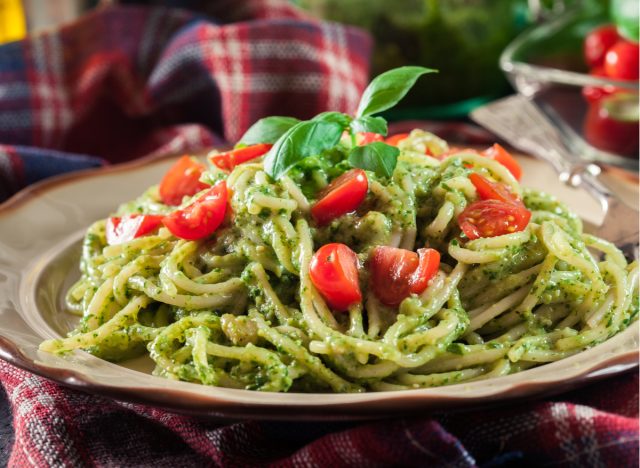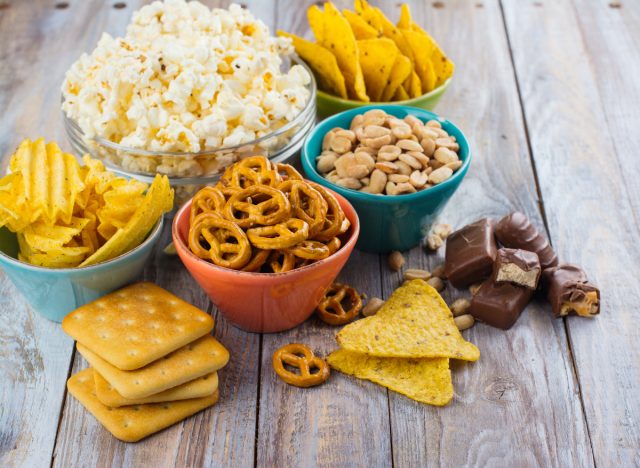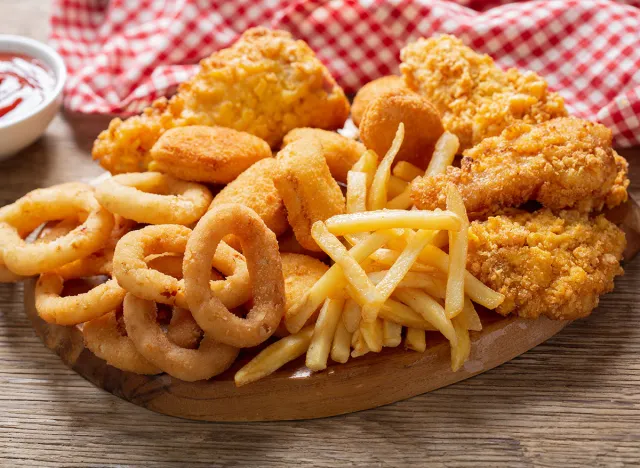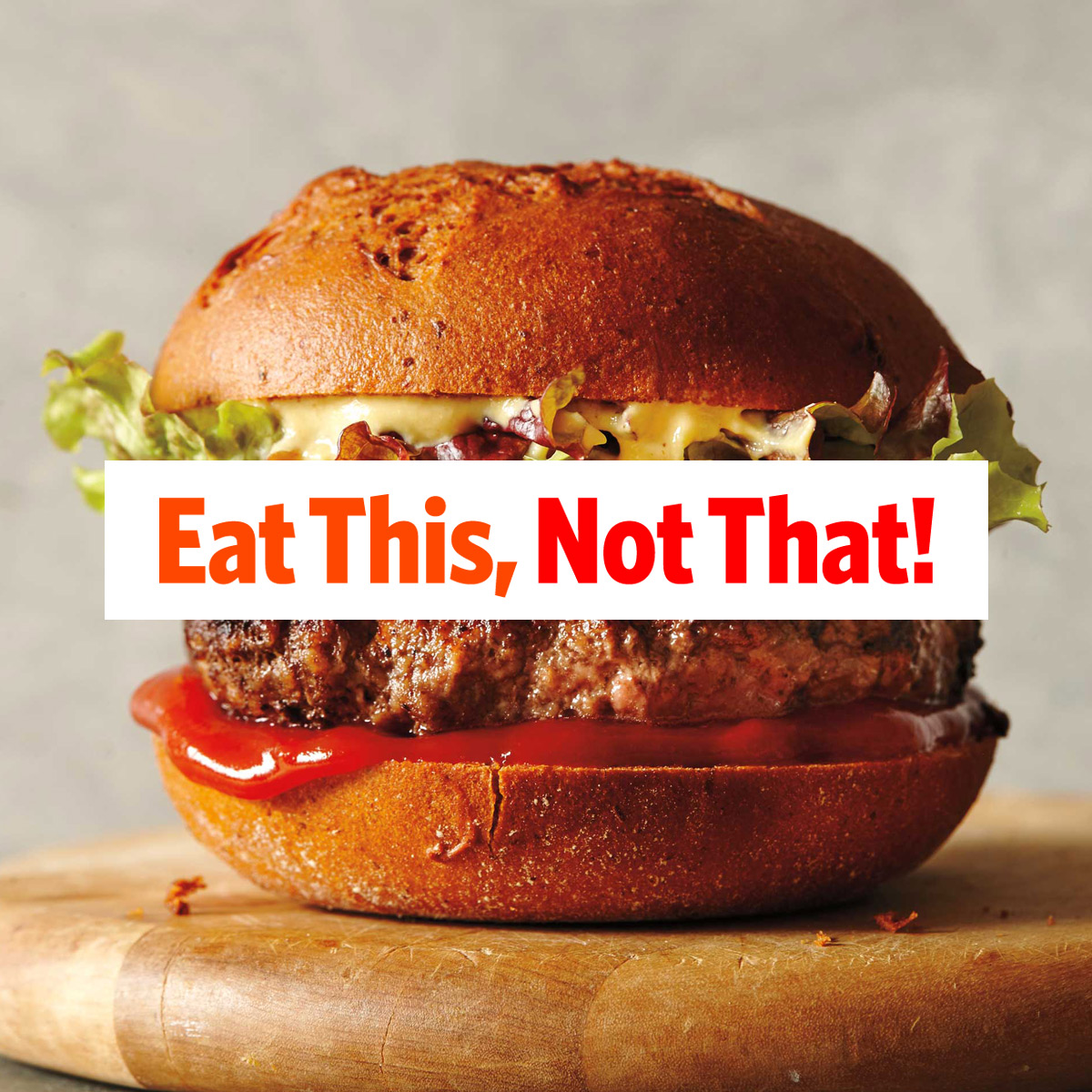There’s no shortage of stressors in our lives; your boss, the traffic, the mortgage, inflation, the kids’ failing grades. How about the latest conspiracy theory going around? According to the American Psychological Association, 77% of Americans say the future of our nation is a significant source of stress. Here’s another bummer to add to your stress load: simply being stressed can make you gain weight. When under stress, your adrenal glands start pumping the stress hormones cortisol and adrenaline into your bloodstream, leading to stress-triggered weight gain.
“If your cortisol is too high, this negatively impacts your sugar metabolism, causing you to store energy as fat; you’ll gain weight around your middle,” explains endocrinologist Florence Comite, MD, founder of Comite Centers for Precision Medicine & Health.
Stress can lead to weight gain another way—overeating. When we are under chronic stress, we tend to crave the comfort of food, especially high carbohydrate “comfort foods” that make us feel so much better that we keep eating them. And if that doesn’t make you want to reach for a doughnut, certain foods themselves can exacerbate feelings of stress.
“The worst stress-inducing foods can often lead to binge eating episodes due to the drastic rise in cortisol levels combined with an increase in insulin that occurs when we eat them,” says Kellie K. Middleton, MD, MPH, a sports medicine physician and surgeon in Atlanta. “Eating these foods causes a surge in sugar followed by a quick drop, which can cause us to crave more sugary or processed snacks, which can cause weight gain as the body is unable to efficiently regulate its blood sugar levels.”
Here are the top foods that can cause stress, leading to abdominal fat and stress-triggered weight gain. And for more expert-recommended healthy eating advice to help you prevent stress-triggered weight gain, be sure to find out which are the 6 Best Foods To Avoid Stress-Triggered Weight Gain, Say Dietitians.

It may be hard to believe that delicious pastries, like those flaky, buttery croissants and cakey, sugar-topped muffins, can cause the same hormonal response that a tyrant boss can, but it’s true.
“These foods are high in sugar, fat, and refined carbohydrates, which can cause or exacerbate stress, causing a spike in cortisol levels,” says Dr. Middleton. In addition to cortisol, these foods prompt another hormone, insulin, to be released. “These foods are often referred to as ‘trigger foods’ because they trigger the flood of insulin which signals the brain that more sugar (energy) is needed,” she says.

Morning may be the worst time to have your cup of coffee if you want to avoid stress-induced weight gain. Cortisol levels in the body naturally rise and fall throughout the day in tune with the hormonal cycle known as the circadian clock. Research shows that the body releases the highest amount of cortisol between 6 a.m. and 10 a.m. to help you wake up. Caffeine causes more cortisol to be produced, so that morning jolt hits at the exact time your body’s cortisol is at its peak. But a cup of coffee any time of day can boost stress hormones “and cause feelings of anxiety and stress,” says Barbara Kovalenko, RD, and nutrition consultant at Lasta. “This can lead to cravings for sugar and carbs, which can further exacerbate weight gain.”

Even if you don’t have celiac disease but may be very mildly sensitive to gluten, foods like pasta and bread may cause your body to secret cortisol. “You may not notice the effects as you might with a true food allergy. But over time, the low-grade inflammation that occurs due to food sensitivity will increase your cortisol levels and keep your body in a state of stress,” says Kristina Ford, a board-certified physician’s assistant and functional health and nutrition consultant. “Cortisol can influence appetite and cravings when it binds to specific receptors in our hypothalamus, our ancient brain. This releases hunger hormones and dysregulates other hormones leading to an increase in appetite.”

Cookies, pretzels, tortilla chips and potato chips are more highly processed foods that can increase anxiety and psychological stress. “Binge eating large amounts of these foods can lead to feelings of guilt and shame, which can further exacerbate stress levels,” says registered dietitian nutritionist Mary Sabat, MS, RDN, a trainer and owner of Body Design by Mary.

Sugary beverages like soda and sweet iced tea can cause a spike in blood sugar levels, followed by a crash, which can lead to fatigue and irritability, two common symptoms of stress. “Soda triggers the release of the hormone cortisol to help the body cope with the stress,” says Sabat. “High levels of cortisol can lead to fat storage in the abdominal area, as well as cravings for more sugary and processed foods.”

A glass of wine with dinner and another while Netflixing might seem like a useful way to leave the stress of the day behind, but researchers say that in response to alcohol, cortisol can be greater than levels typically seen in response to stressful events. And here’s another way alcohol causes stress-induced weight gain: “Alcohol consumption disrupts sleep,” notes nutritionist Lisa Richards, author of The Candida Diet. Inadequate or disturbed sleep raises cortisol and often causes morning cravings for high-carbohydrate and high-fat foods.

“Processed carbohydrates like waffles and white bread are quickly digested, leading to a spike and then a crash in blood sugar levels, which can lead to feelings of anxiety, lethargy, and irritability,” says Sony Sherpa, MD, a holistic physician from Nature’s Rise. “Eating these types of foods triggers the “reward” centers in our brain, creating a temporary sense of pleasure that encourages us to want to eat more of them.” Dr. Sherpa adds that foods that do not provide sufficient nutrition can trigger stress in our bodies and our brains. “Consuming high amounts of these foods often leads to feelings of guilt and dissatisfaction in the long term,” she says.

Deep fried foods like fried chicken, French fries, batter-dipped and fried fish, and apps like breaded and fried mozzarella sticks play a role in increasing stress hormones. “These foods tend to have trans fats that are known to increase the inflammation in the body, which will cause an increase in cortisol,” says Ford. “The body has a harder time breaking down trans fats, so it cannot use this as an immediate fuel source. So, instead, it will store it which requires extra work on the body system.” The worst kinds of trans facts are known as industrial trans fatty acids, which are partially hydrogenated vegetable oils that contribute to cardiovascular disease, according to the journal Advances in Nutrition. They are still found in many processed foods and oils used to fry foods.

“Fast foods like hamburgers and pizza that are high in salt, fat, and calories lead to an increase in stress hormones, too,” says Dr. Sherpa. “High-fat dairy products are stressors, as well, and can add extra fat and calories to your diet without providing any nutritional value. Recognizing that you’re not eating healthfully as you could be often contributes to the psychological stress of self-criticism.”


